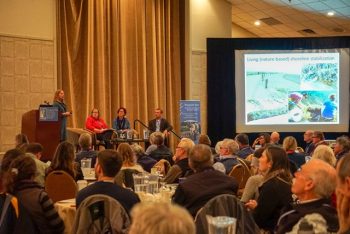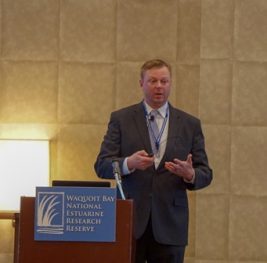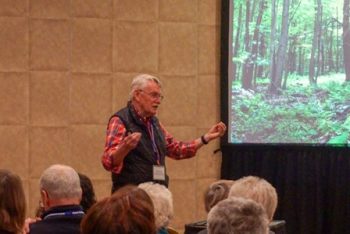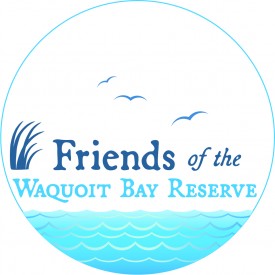
Day 1
Tuesday, December 4, 2018
Water Quality
(Click on the Titles to view the full presentation.)
PLENARY SESSION 1: Shellfish Aquaculture
Restoring water quality and curbing nutrient pollution remains a pressing challenge and one of the most important environmental priorities for Cape Cod towns. Shellfish aquaculture is listed in the Cape Cod 208 Area-Wide Management Plan as one of the non-traditional approaches that could be utilized among the mix of solutions that towns could employ.
Shellfish 101 – A Primer on Local Shellfish Life History and Care
Christina Lovely, Fisheries Propagation Technician, Town of Falmouth
Management Considerations for Shellfish Aquaculture and Propagation Activities in Massachusetts
Christopher Schillaci, Aquaculture and Propagation Project Manager, Division of Marine Fisheries
Town of Mashpee Case Study
Rick York, Director of Natural Resources and Ashley Fisher, Shellfish Constable, Town of Mashpee
Town of Falmouth Case Study
Roy (Chuck) Martinsen, Deputy Director, Marine and Environmental Services and Shellfish Constable, Town of Falmouth
Restoration and Aquaculture: Shellfish Projects in MA
Stephen Kirk, Coastal Program Manager, The Nature Conservancy
Town of Wellfleet Case Study
Alex Hay, Co-Owner, Mac’s Seafood & Wellfleet Shellfish Company, & Chair, Wellfleet Wastewater Management Planning Committee
Dynamics in Using Shellfish Harvest for Nitrogen Mitigation
Joshua Reitsma, Marine Program Specialist, Cape Cod Cooperative Extension & Woods Hole Sea Grant
Working Towards an Ecosystem Level Understanding of How Different Oyster Aquaculture Practices Alter Nitrogen Cycling
Dr. Daniel Rogers, Stonehill College
The Massachusetts Shellfish Initiative: Background, Overview, Participation, Opportunities
Scott Soares, Boston Bay Consulting & Sean McNally, UMass Boston
Plenary Session 2: Watershed Permit Case Study
In August 2018, MassDEP issued a first-of-its-kind Massachusetts watershed permit. This presentation describes what the permit is, how it came to be, and why this is a blueprint for the future of watershed planning and permitting.
Hatching a Watershed Permit: A Pleasant (Bay) Experience
Mike Giggey, Senior Vice President, Wright-Pierce, Carole Ridley, Principal, Ridley & Associates, and Brian Dudley, Environmental Engineer, MA Dept. of Environmental Protection
Concurrent Break-Out Sessions
Session 1: Harmful Algal Blooms & Stormwater Management
Utilizing the Ecology of Cyanobacteria to Address Problems of Cyanotoxins in Lakes
Dr. Jim Haney, Dept. of Biological Sciences, University of New Hampshire
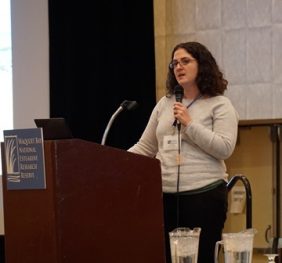
April Wobst
Part 1: Improving Water Quality in the Three Bays through Stormwater Management
April Wobst, Restoration Ecologist, Association To Preserve Cape Cod
Part 2: Design and Construction of Stormwater BMPs in Three Bays
Michelle West, Senior Water Resources Engineer, Horsley Witten Group
Session 2: Contaminants of Emerging Concern
Sources, Transport, Exposure and Effects of Poly- and Per Fluoro Alkyl Substances: A Program Update Focusing on Cape Cod Efforts
Alyson Mccann, Water Quality Program Coordinator, University of Rhode Island, Cooperative Extension, Department of Natural Resources Science
The Occurrence of Poly and Per Fluoro Alkyl Substances (PFAS) in Cape Cod Groundwater
Tom Cambareri, Water Resources Technical Services Director, Cape Cod Commission
Strategies for Removing Contaminants of Emerging Concern at Municipal Wastewater Treatment Facilities
Marc Drainville, Principal, GHD
Session 3: Onsite Septic Systems
West Falmouth Harbor Nitrogen-Reducing Septic System Demonstration Project
Maureen Thomas, Water Resource Specialist, Buzzards Bay Coalition
An Overview of Onsite Septic System Performance and Research Update on Promising New Approaches
George Heufelder, Director, Massachusetts Alternative Septic System Test Center
Day 2
Wednesday, December 5, 2018
Coastal Resilience
When the Storms Just Kept Coming: Mining Resilience Lessons for the Region from this Past Winter
Panelists
Emergency Preparedness & Resiliency in the Energy Industry
Matthew Waldrip, Senior Specialist, Eversource Energy
Emergency Management & Regional Coordination
Sean O’Brien, Department Director/ Emergency Preparedness Coordinator, Barnstable County
Public Works and Safety
Ray Jack, DPW Director, Town of Falmouth
Shoreline Changes and Community Experiences
Robert Duncanson, Director, Health and Environment, Town of Chatham
Mapping Storm Tide Pathways for Preparedness Planning
Steve Mague, Adjunct Faculty, Center for Coastal Studies
Mapping Stormtide Pathways on Cape Cod Bay: A New Flood Mapping & Preparedness Project
Shannon Hulst Jarbeau, CRS & Floodplain Coordinator, Barnstable County, Cape Cod Cooperative Extension & Woods Hole Sea Grant
Update on Regulations for Land Subject to Coastal Storm Flowage and Thoughts on Resiliency Planning
Lealdon Langley, MA Department of Environmental Protection
State and Federal Guidance for Permitting Coastal Resilience Projects: A Panel Discussion with Regulatory Experts.
Panelists presented practical experiences and perspectives related to use of living shorelines for shoreline stabilization
Moderator: Julia Knisel, Coastal Shoreline & Floodplain Manager, MA Office of Coastal Zone Management
Rebecca Haney – MA Office of Coastal Zone Management
Kathryn Ford – Division of Marine Fisheries
Lealdon Langley – MA Department of Environmental Protection
Christine Jacek – U.S. Army Corps of Engineers
Massachusetts Municipal Vulnerability Preparedness (MVP) Program: Empowering Communities to Address Climate Resilience from Planning to Implementation
Margot Mansfield, Climate Change & Coastal Hazards Analyst, MA Executive Office of Energy & Environmental Affairs
Protect, Accommodate or Retreat? Integrating Adaptation Strategies and Ecosystem Services in the Cape Cod Coastal Planner
Jennifer Clinton, Special Projects Coordinator, Cape Cod Commission & April Wobst, Restoration Ecologist, Association to Preserve Cape Cod
Planning for Marsh Resilience, Ecosystem Changes, and Habitat Restoration in a Changing Climate
Innovative use of SLAMM to Project Wetland Changes Due to Tidal Restoration to Guide Adaptive Management Decisions for the Herring River Estuary
Elise Leduc, Coastal Scientist, Woods Hole Group
Soil Survey and the Coastal Zone: Bridging the Land-Water Divide
Maggie Payne, Resource Soil Scientist, USDA Natural Resources Conservation Service
Opportunities for, and Limitations on, Salt Marsh Landward Migration with Sea Level Rise
Stephen Smith, Ecologist, Cape Cod National Seashore
Update on Results from the NERRS Salt Marsh Thin Layer Placement Experiment & Crab Research
Megan Tyrrell, Research Coordinator, Waquoit Bay National Estuarine Research Reserve


